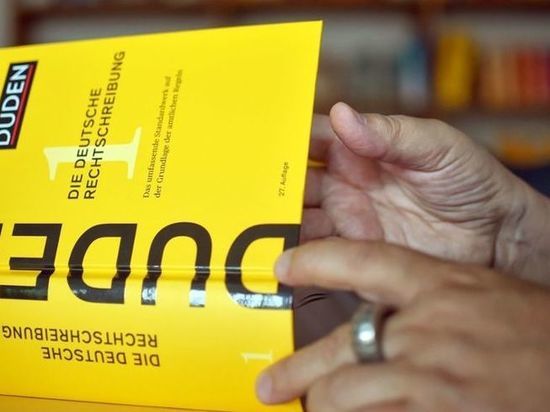New German Spelling Dictionary has appeared in German bookstores this week “Die deutsche Rechtschreibung. Der neue Duden ”, containing on its 1,300 pages about 148,000 words and expressions, including almost 3,000 new terms.
How many words there are in modern German today, even experts cannot say. The Duden editors estimate this number to be somewhere between 300,000 and 500,000 words. At the same time, from 12,000 to 16,000 words are actively used, of which at least 3,500 words of foreign origin. For comparison, we note that the active vocabulary of the great German classic Johann Wolfgang von Goethe was about 90,000 words, and the dictionary of the Pushkin language used by A.S. Pushkin in his works includes about 21,000 words.
At least 50,000 words of the modern German language are in a passive state, many concepts have disappeared from use altogether. For the first time, users of the dictionary received guidance on gender-correct use of the language: the dictionary contains gender descriptions of the meaning of words. For example, “Corona” as a feminine name and “Coronavirus (erkrankung)” as a disease. “This is a topic for which there is no standard yet,” says Duden Chief Editor Dr. Kahtrin Kunkel-Razum.
The criterion for the inclusion of new words in the spelling dictionary was the frequency of their use in oral and written speech. Thus, from the list of 15,000 new words, only 3,000 are included in the dictionary, including such new nouns and verbs as Flugscham (“shame because you fly (in airplanes)”), Elektroscooter (“electric scooter”), transgender (“ transgender ”), dawiderreden, (to refute), Murrkopf (silent), erstlich (above all), Fernsprechanschluss (telephone), irrwerden (to get lost), Jägersmann (hunter) and so on.
According to Katrin Kunkel-Ratsum, the word “coronavirus” was included in one of the previous editions of such a dictionary after the outbreak of the Sars epidemic in 2002/03. However, despite the impact of the current pandemic and the presence of new words such as Reproduktionszahl and Lockdown in the dictionary, Kunkel-Ratsum states: “This is not the Coronavirus Duden.”
Almost 300 terms were deleted from the old dictionary, such as Kabelnachricht (“cablegram” or “telegraphic message”).
No sooner had the sellers of bookstores placed the new edition of the dictionary on the shelves, than numerous responses to this book appeared on the Internet and in German newspapers. Here is just one of them, owned by a computer specialist from Munich: “I use Duden regularly, but only online. The words I am looking for are quite unusual, they are not used in everyday language – they are often technical terms from the computer language of my professional field. For example, I recently came across the word Authentifizierung (“authentication”). I would not buy a paper dictionary. But having it online is very useful. “
It is also useful for Russian entrepreneurs to study these innovations, so that during business conversations, as if casually, as if inadvertently, to show that we are not “bastard” in German spelling. And we can speak not only in the language of Goethe, but also in the language of Angela Merkel.
Compiled by Alex Gradov
Germany says this:
German Scientists: Heart Damage After Coronary Disease
Germany: Bosch Introduces Part-Time Work in Abstatt
Frankfurt Momem Technuseum hopes to open in November 2020
Germany: In the first half of the year, KfW issued a record volume of loans
